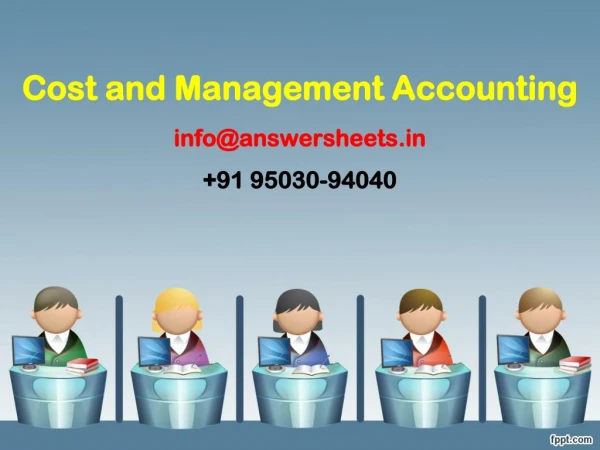A machine manufactures 10000 units of a part at a total cost of Rs. 21 out of which Rs. 18 is variable.
www.answersheets.in info.answersheets@gmail.com info@answersheets.in 91 95030-94040 Cost and Management Accounting Total marks - 100 Section - A - Attempt any ten questions. Each question is 4 marks. (10 × 4 = 40) Q1) a) Define period cost. b) Explain the meaning of cost accounting. c) Distinguish between direct and indirect cost. d) Explain Contribution. e) How does cost volume, profit analysis is helpful in cost control. f) How margin of safety can be improved? g) What do you mean by relevant cost? h) State the cost data required for determining the profitability of various products. i) Explain various conditions of Depression. j) What is out of pocket cost? k) What are the limitations of standard costing? l) Distinguished between standard cost and estimated cost. m) Briefly explain labour variance. n) Explain the need for reconciliation between budgeted profit and actual profit. o) Prepare the Performa for cost sheet. Section – B – Attempt any 6 questions. Each question is 10 marks (10 × 6 = 60) Q2) what is meant by classification of overheads and why it should be attempted? Q3) Cost volume profit analysis is mainly used in guiding decisions yet to be made. Explain the statement by giving examples. Q4) Explain the meaning and uses of P/V ratio. Q5) The sales turnover and profit during two year were as follows. Year Sales Profit 2005 150000 20000 2006 170000 25000 you are required to calculate (a) Fixed cost (b) Breakeven point Q6) A machine manufactures 10000 units of a part at a total cost of Rs. 21 out of which Rs. 18 is variable. This part is readily available in market at Rs. 19 per unit. If the part is purchased from market then the machine can be utilized to manufacture a component in same quantity contributing Rs. 2 per component or it can be hired at Rs. 21000. Recommend which alternative is profitable. Q7) How product profitability can be ascertained with the technique of marginal costing? Q8) Explain various cost concepts in decision making. Q9) Distinguish between relevant and irrelevant cost. Q10) Explain briefly the significance of standard costing as a technique of cost control. Q11) Given that the cost standards for material consumption are 40Kg at Rs.10 per Kg. Compute the variances when actual are 48 Kg at Rs. 12 per Kg. Q12) Prepare cost sheet with the help of imaginary figures. Q13) What are the main advantages of preparing cost sheet? www.answersheets.in info.answersheets@gmail.com info@answersheets.in 91 95030-94040
★
★
★
★
★
129 views • 8 slides


















